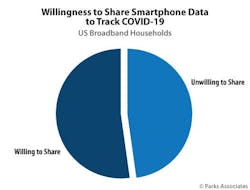Parks Associates' latest research entitled, COVID-19: Impact on Telehealth Use and Perspectives, finds that over 50% of US broadband households are willing to share smartphone data to aid in COVID-19 contact tracing, while another 20% could be convinced provided privacy protections are in place.
The research tracks changes in consumer attitudes and adoption of telehealth services as a result of COVID-19 and measures future interest in telehealth services beyond the pandemic. "Use of telehealth services nearly tripled year-over-year, with 41% of US broadband households having used a telehealth service in the past 12 months," explains Kristen Hanich, senior analyst, Parks Associates.
Hanich adds, "This increased usage of telehealth services comes as many consumers are unable – or unwilling – to visit a physician in person due to widespread efforts to minimize in-person contact with patients. It is a dramatic switch for both care providers and telehealth services, and provided patients have a good experience, the market is likely to see continued usage on a permanent basis."
Parks Associates will discuss this renewed emphasis on telehealth and home-based care at its seventh annual Connected Health Summit: Consumer Engagement and Innovation conference, hosted virtually on September 1-3. The virtual conference will feature multiple research presentations and interactive sessions focused on the key topics in the connected health space.
The agenda includes visionary presentations from Beth Israel Deaconess Medical Center / Harvard Medical School, Blue Shield of California, Care Planning Institute, Cincinnati Children's Hospital Medical Center, Cox Communications, People Power, and UnitedHealthcare, with special networking events where this online community of industry leaders can connect, share insights, and discuss the immediate, near-term, and long-term impact of COVID-19 on the consumer healthcare market.
Parks Associates' COVID-19: Impact on Telehealth Use and Perspectives report also notes that those who experienced COVID-19 symptoms are more willing to share smartphone data to aid in contact tracing than those who have not experienced symptoms. Still, nearly half of those who have not experienced symptoms are willing to share their smartphone data, finds the study.
"Apple and Google have together developed an API and framework that developers, in partnership with public health officials and other stakeholders, can use to build contact-tracing apps," Hanich said. "The industry can drive widespread uptake of these solutions by emphasizing the public benefits of this data sharing while also stressing the privacy protections in place for anyone who participates."
